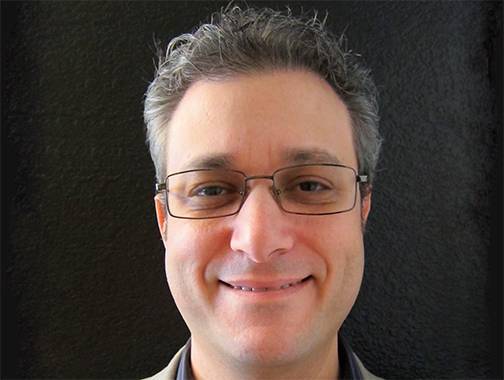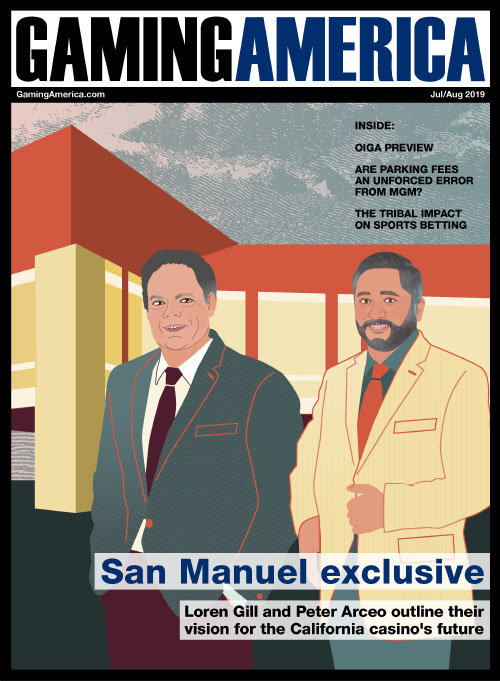
Many of the background stories of interviewees appearing in magazines such as this one involve things like business degrees, suit-and-tie jobs and an overwhelming feeling they were always destined for Wall Street, or at least something relatable.
Jason "Wolf" Rosenberg's story is somewhat different. Our interview with the CEO of consultancy American iGaming Solutions lasts for about an hour, but could go on much longer, as he tells us about anecdotes such as playing poker against a trained chimpanzee, his relationship with wolves, and occasionally, we have a bit of chat about the US gaming industry.
There is plenty to cover, as Rosenberg's story goes back to around the turn of the century, when he moved to Las Vegas to become a professional poker player. "I initially went out there to start a project for the company I had been working for in Minneapolis, but it evolved into me being able to play poker sufficiently and make a living out of it, so I stayed," he tells Gaming America.
"It ended up working out quite well for the first 11 months, but in the 12th month, I couldn’t win a hand and it was pretty scary. It was at that point that I met some people in the poker industry and the online industry and was able to get a consulting job to help them decide what buttons need to go where and what features need to be programmed. I ended up being a sponsored player very early."
It was timely that Rosenberg's own relationship with poker crossed over with the industry's boom period. From the hit movie "Rounders" starring Matt Damon in 1998, to Chris Moneymaker's tournament victory at the World Series of Poker Main Event in 2003, to the launch of TV shows such as Poker After Dark, it was a time when poker was in the spotlight.
It was even a time where Mikey the Chimp came to prominence. Rosenberg tells us about his encounter with the poker-playing celebrity. "There’s a guy named Max Wright, who had a site called PokerShare back in the day," he says. "Wright and his team were trying to figure out how they could differentiate themselves, and they contacted a prime ape rescue here in the US, which had a chimpanzee that could play poker. I got to play him in Las Vegas, and found out after I played him that he would recognize pairs or face cards.
"We played back and forth for quite a while and at the end of it, he got tired and he leaned over the table, took my cards and put them in my mouth. That was the signal he was done, so we decided we would both go all in before the cards were dealt in the next hand. I don’t even remember what I had. I know he had a 10 and a 3, but spiked two 10s on the flop, so he had a three of a kind and I had nothing."
Beating Rosenberg was not the only reason for Mikey's fame, as he was later entered into the WSOP Main Event, but was disqualified on the grounds of being underage at four years old.
Rosenberg was able to recover from the embarrassment of his loss though, as he moved into the online gaming space as VP Business Development of affiliate management company CanAffco. But while his poker career crossed over with the boom, his affiliate career crossed over with the passing of the Unlawful Internet Gambling Enforcement Act (UIGEA) 2006, placing a federal ban on online gambling transactions in the US.
Rosenberg says: "UIGEA definitely affected things. I was doing quite well at the time and I was coming up with promotions that online poker sites would pay me for. That then kind of went away, because there was so much traffic that went to a couple of sites. It was devastating for a lot of affiliates and a lot of online poker rooms folded very quickly.
"But instead of going after affiliates that would compete against each other with their poker forums, I kind of flipped it around to where people could represent their country. I was really able to harness a lot of non-US traffic by awarding really large prize pools to whichever countries did the best in one of my tournaments."
Significant, era-defining events never seem to be too far away in the US gaming industry, often having strong impacts on several careers. The next such event to influence Rosenberg was Black Friday in April 2011 – when the FBI shut down PokerStars, Full Tilt Poker and the Cereus Poker Network, after they were deemed to have breached the terms of UIGEA. American iGaming Solutions, founded in the same year, had to quickly change its focus. Rosenberg set up the business with partner Itsik Akiva, who Rosenberg has now known for 12 years, and the law dictated the company to cover social gaming – and not just for predominantly online-facing clients.
Rosenberg says: "When I first started the company, it was all going to be about online gaming, but I had to change that. Now, in the present day, what we do is mainly work with brick-and-mortar casinos' online operations. We work with some that are purely online in regulated markets. Some of the time, we are helping them with online gaming for real money, sometimes it’s social gaming, sometimes it’s skill games or esports. It can also be any loyalty program an operator wants to start."
The next key development for Rosenberg to be concerned about is of course sports betting, following the repeal of PASPA in May 2018. While six states have joined Nevada on the list of states with regulated and launched sports betting at the time of writing, a total of four states have launched regulated mobile sports betting on top of Nevada. How has this impacted on business for Rosenberg so far and can sports betting really thrive in the US without widespread mobile regulation?
"The way you have to think about it is many people in this day and age have a toilet in their house. The reason they have a toilet in their house, instead of an outhouse, is because it’s a lot more convenient.
"What we’re going to see is the states that do legalize it will see an increase in revenue, but it will not even come close to reaching its full potential, because of the lack of mobile betting. Otherwise, it’s not going to work out as well as they are planning. They can have all the projections they want, but it needs the mobile play to it, specifically with sports, to reach its maximum potential."
This is not the first time we have ever spoken to Rosenberg, but there is one missing piece of information which for some reason, we had never got round to asking previously. Why exactly does everyone refer to him as "Wolf" or "Wolfie," as we keep hearing? The story of how Rosenberg fell in love with wolves is tinged with sadness, as it goes back to his ownership of a pet wolf-dog hybrid, Takoda, with a former girlfriend, which led to a custody battle.
"I’ve been working with wolves for a couple of decades now," he says. "They are all rescued animals in a sanctuary in the high desert mountains of Southern California. I was at an affiliate conference showing pictures of this and some guy started calling me Wolfie and then everyone did. It just stuck.
"I can actually talk to you about wolves longer than I can about gaming. They’re all rescued from either the wild or breeders that are breeding them illegally to sell them, or we get them from private owners that think it’s a great idea to have a pet wolf. A lot of times we have to rehabilitate them. They either have severe trust issues or physically they are horribly malnourished. They stay with us; we can’t release them because they know people as a food source at this point. So we take care of them and give them a really good home and a lot of love."
All these years later, he is an adopted member of a wolf pack at the aforementioned Wolf Mountain Sanctuary in Southern California – a Native American operation where Rosenberg helps out as a volunteer. He says: "The wolves were very curious about me and I immediately got to go in with the alpha male, who needed to check me out and make sure I wasn’t a threat to anybody.
"I passed the test and was adopted by the pack. Not everybody gets to do that, and for some reason, I have a gift of being able to go in with all the wolves and they know I am not a threat. There’s a whole hierarchy and I fit into it. There’s a couple that are above me and when they give me warnings, it’s time for me to leave.
"We also have to teach them they can’t play with us like they play with each other and usually that’s one of my jobs.
"But you can create some incredibly strong bonds with these animals and it’s amazing."
With there being such an eclectic mixture of things that have happened to Rosenberg in the last 20 years, it's so easy to become distracted away from gaming topics in this conversation.
Moving back to business, what vision does American iGaming Solutions bring to clients? Rosenberg can explain this in six steps.
He says: "First, you have to have your education piece, which the key stakeholders have to be behind. They have to know what’s going on. Otherwise, it will follow what often happens in the US with online and social gaming and be handed to someone who already has a full-time job.
"The second step is really a vendor comparison. It’s a comparison matrix of what the different providers offer. We’ll go through five or six of them, depending on the operator’s requests. The third step is contacting and negotiation. Most brick-and-mortars have never negotiated with an online team. You really have to have someone in the middle that can speak both languages and help the attorneys.
"Step four is the integration and implementation piece. Does this social or online gaming technology have its own rewards program? Can we link it into the brick-and-mortar program? How will it be integrated? Our fifth step is the pre-launch marketing and operations. Here, we’re going to make sure we have the proper staffing set up and everyone at the brick-and-mortar knows about this.
"The sixth and last step is post-launch analysis, where we move into the operational routine of analyzing what we’ve done and optimizing it. We might be increasing or decreasing staff, depending on what our objectives are and how well we’re doing.
"Whether an operator knows it, we will be doing these six steps. If you do these six steps, you never have to talk to a consultant for new technology."
Let's see if American iGaming Solutions can make its clients the leaders of the pack in online gaming with this strategy.

